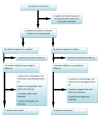Long-term psychological effects of a no-sedation protocol in critically ill patients
- PMID: 22166673
- PMCID: PMC3388632
- DOI: 10.1186/cc10586
Long-term psychological effects of a no-sedation protocol in critically ill patients
Abstract
Introduction: A protocol of no sedation has been shown to reduce the time patients receive mechanical ventilation and to reduce intensive care and total hospital length of stay. The long-term psychological effects of this strategy have not yet been described. The purpose of the study was to test whether a strategy of no sedation alters long-term psychological outcome compared with a standard strategy with sedation.
Methods: During intensive care stay, 140 patients requiring mechanical ventilation were randomized to either no sedation or sedation with daily interruption of sedation. This study was done as a single-blinded cohort study. After discharge, patients were interviewed by a neuropsychologist assessing quality of life, depression, anxiety, and posttraumatic stress disorder.
Results: Two years after randomization, 38 patients were eligible for interview, and 26 patients were interviewed (13 from each group). No difference was found with respect to quality of life (Medical Outcome Study, 36-item short-form health survey). Both mental and physical components were nonsignificant. The Beck depression index was low in both groups (one patient in intervention group versus three patients in the control group were depressed, p = 0.32). Evaluated with the Impact of Events Scale, both groups had low stress scores (one in the intervention group versus two in the control group had scores greater than 32; p = 0.50). State anxiety scores were also low (28 in the control group versus 30 in the intervention group, p = 0.58).
Conclusions: Our data suggest that a protocol of no sedation applied to critically ill patients undergoing mechanical ventilation does not increase the risk of long-term psychological sequelae after intensive care compared with standard treatment with sedation.
Trial registration: ClinicalTrials.gov NCT00466492.
Figures
Comment in
-
Sedation, delirium and psychological distress: let's not be deluded.Crit Care. 2012 Jan 16;16(1):109. doi: 10.1186/cc11176. Crit Care. 2012. PMID: 22340142 Free PMC article.
References
-
- Jacobi J, Fraser GL, Coursin DB, Riker RR, Fontaine D, Wittbrodt ET, Chalfin DB, Masica MF, Bjerke HS, Coplin WM, Crippen DW, Fuchs BD, Kelleher RM, Marik PE, Nasraway SA Jr, Murray MJ, Peruzzi WT, Lumb PD. Clinical practice guidelines for the sustained use of sedatives and analgesics in the critically ill adult. Crit Care Med. 2002;30:119–41. doi: 10.1097/00003246-200201000-00020. - DOI - PubMed
Publication types
MeSH terms
Associated data
LinkOut - more resources
Full Text Sources
Medical


